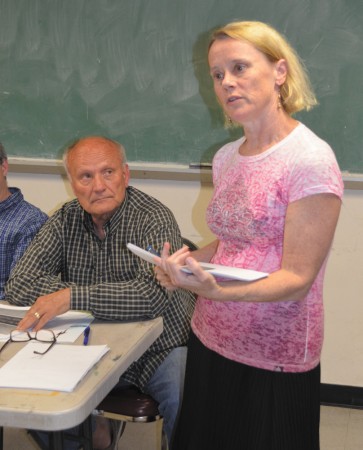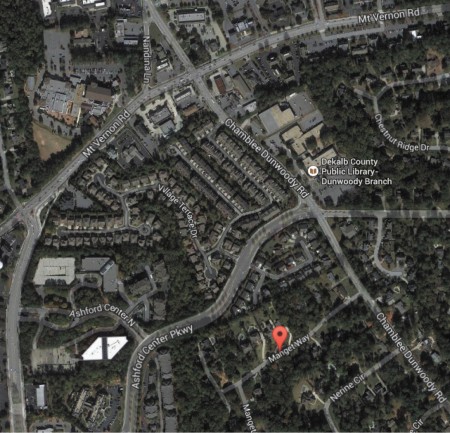
Back in March, neighbors on Manget Way were curious about who bought the big brick house in the middle of their block.
“It was kind of a great mystery,” said Larry Gluth, who lives two doors away from the house on Manget Way.
“This particular house had been on the market for a while. As neighbors, we were delighted they got [nearly] full listing [price] … but there was this whole air of secrecy around who the buyer was.”
A few weeks ago, a neighbor chatting with workmen at the house found out the new owner was a California company called the Center for Discovery, Gluth said. Then, a couple of days later, Gluth stopped in and saw work was being done without a posted permit from the city of Dunwoody.
City officials quickly issued an order stopping work on the house, which the Center for Discovery plans to convert into a home treatment facility for teenage girls with eating disorders.
Since then, debate over the Center’s plans for the home has spread through Dunwoody.
Neighbors on Manget hired a lawyer to represent their interests. The board of the Dunwoody Homeowners Association debated the situation April 13, and voted to ask the city to “ascertain the facts expeditiously in respect to the facility on Manget Way and report their findings directly back to the DHA and community.”
During a 90-minute conference call two days earlier, on April 11, a man introduced as Dr. Craig Brown, CEO and founder of the Center for Discovery, said the company purchased the Dunwoody house after conferring with state and city officials about their plans to open the company’s first facility in Georgia. About 10 people, including two reporters and a city councilmember, listened in on the call.
Brown said treatment for eating disorders often is needed in wealthy communities such as Dunwoody. “It’s a very serious disorder …,” he said. “We view these children as really fighting for their lives.”
Brown said the company now operates similar homes in California, Virginia, Illinois and elsewhere. Homes typically house six clients, he said, and are staffed by professionals who work with the clients at the homes.
“We’re used to being in the nicest neighborhoods in the states we’re in,” he said.
He said the company wants to be a good neighbor in Dunwoody.
“Our goal is for individuals to be able to drive up and down the street and not know our home is any different from other homes in the neighborhood,” he said. “Our goal is to be as benign and nondescript in the neighborhood as possible.”
Brown said that when company representatives started preparing to open a home in Georgia, they checked with state officials and were told the home would be a personal care home. When company representatives told a Dunwoody city staff member Center for Discovery planned to operate a personal care home, the staffer issued a letter saying a personal care home could operate legally in a single-family neighborhood in Dunwoody.
But residents on Manget Way now question whether the home, as described by Brown, meets Dunwoody’s definition of a personal care home.

Instead, their lawyer, Linda Dunlavy, told members of the DHA board she believed the home was really more like a medical treatment facility, which is not allowed in a single-family neighborhood.
“It’s pretty clear to us it’s not a personal care home and it’s not akin to a personal care home,” she said. “I think it’s a hybrid. I’ve tried to fit it into a clear, little box and I can’t.”
She said the home could in the course of a year house up to 36 children who would be served by a dozen staff members. Neighbors worry about traffic and having a business on their street. “This isn’t just a ‘nimby’ concern,” she said.
City Manager Warren Hutmacher, who attended the DHA meeting, said no permits have been issued for the property.
And, he said, city officials now have different information to consider than they did when the initial zoning letter was issued, saying a personal care home was allowed in areas zoned for single-family residences.
“This is the beginning of the process, not the end of the process,” Hutmacher said.
Gluth, who also attended the DHA meeting, said he hopes the home will be stopped before it gets too entrenched in the neighborhood.
“At the end of the day, I think …. if this truly was a personal care home, we’d have to live with it,” Gluth said. “But from everything we know about the center, they are a medical facility. Those are not allowed.”


What neighbors & the Dunwoody Homeowners Association should do is ask the people at Center for Discovery for the precise locations of their other facilities and then reach out to people living in those neighborhoods for their perspective on the facilities in their neighborhoods. This information should provide the most accurate picture of what’s to come with their planned facility in Dunwoody.